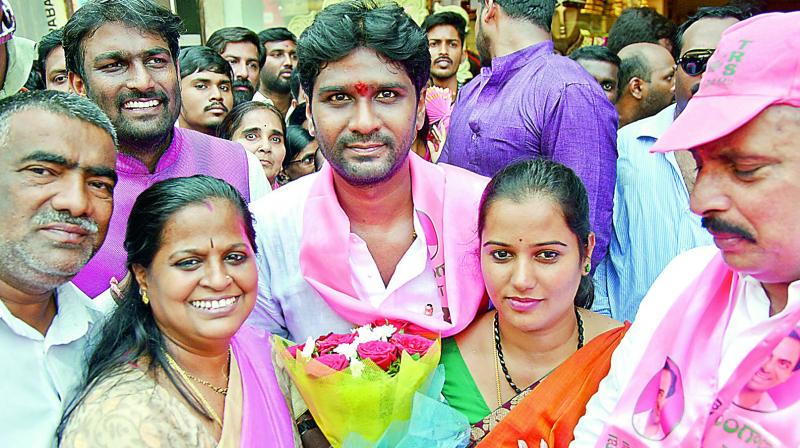Just a matriculate may become your leader
Minimum qualification for lawmakers remains debatable.

Hyderabad: From matriculates who passed with poor marks, to PhDs, multimillionaires to middle classes, an array of Lok Sabha contestants are aspiring to be lawmakers of the nation, and are in the electoral fray in Telangana state.
K. Swamy, 27, BJP candidate from Peddapally Lok Sabha constituency is an SSC pass and a driver by profession with literally no assets, according to the affidavit he filed for the elections. He is pitched against Dr A. Chandrasekhar, 60, of the Congress, a Bachelor of Veterinary Science, and an LLB, and the ruling TRS nominee, B. Venkatesh Netha, an MCom, LLB, PhD (Law) degree holder. Both are financially much better off than Mr Swamy.
TRS nominee Marri Rajasekhar Reddy, 50, who is standing from Malkajgiri is just an Intermediate pass from Wesley Junior College, Secunderabad, but has other advantages.
He is a multimillionaire being director of MLR Infrastructure, and Marri Infrastructure and runs eight educational institutions. Most importantly, the new entrant is the son-in-law of labour minister Ch Mallareddy, a Medchal MLA.
He faces firebrand Congress candidate Anumula Revanth Reddy, 51, a BA from AV College, Hyderabad, with 43 police cases against him, and BJP’s N. Ramachander Rao, an MA in Political Science and a senior lawyer. In India, there is no educational qualification to contest Assembly and parliament elections. Everything under the sun is discussed during elections, but rarely educational qualifications of politicians in the fray.
As per Article 84 of the Constitution, a person is qualified to be a Member of Parliament provided he/she is a citizen of India, has completed 30 years of age in case of the Rajya Sabha and 25 years in case of the Lok Sabha. Ditto with MLA and MLC or any other legislator. Though the issue of minimum educational qualification for lawmakers is raised from time to time, no party in power wants to bell the cat.
“I feel graduation degree should be a must for parliament contestants. When there is minimum qualification for government and most private jobs, why not for lawmakers? More the qualification, the better,” N. Ramachander Rao, BJP Malkajgiri LS nominee and senior lawyer told Deccan Chronicle.
Says a senior TRS leader: “Clout in the constituency, financial position, caste etc, is considered, but not education. It’s a good idea to have minimum qualification.” In the current Lok Sabha elections in the state, there is a mix of least educated and highly educated, poor and ultra rich.
Contesting the Mahbubabad LS constituency are Balram Naik (Congress), SSC, and Maloth Kavitha (TRS) BSc.
From Chevella, Konda Vishveshwar Reddy (Congress), is a businessman and engineer, and the richest candidate in the fray. He is a BE, MS. Dr Gaddam Ranjith Reddy is engaged in business and has a Master’s in Veterinary Science.
From Secunderabad, Anjan Kumar Yadav (Congress), owns a dairy farm and is a BA graduate, G. Kishan Reddy (BJP), Agriculture, has a Diploma in Tool Design, CITD, Talasani Saikiran Yadav (TRS), is a businessman with interests in real estate, Contracts. He has an MBA from Australia.
Asaduddin Owaisi (MIM) from Hyderabad is a Bar-at-Law, LLB, London. “After MBA from Australia, politics was my first choice. My dad (Animal Husbandry minister Talasani Srinivas Yadav) supports it,” says Saikiran Yadav.
In Nizamabad, candidates of the three major parties are highly-qualified. TRS’s K. Kavitha is a B.Tech, BJP’s Dharmapuri Arvind, is an MA in Political Science, and Madhu Goud Yakshi of the Congress is a Master’s in Law.
In contrast, in Adilabad Lok Sabha constituency, Ramesh Rathod, ex-MP of the Congress is an Intermediate pass and so is BJP’s Bapu Rao Soyam.
A study by Delhi-based PRS Legislative Research organisation found that 75 per cent of MPs elected in the 2014 general election had at least a graduate degree, slightly less than the number in the15th Lok Sabha in which 79 per cent of MPs held at least a graduate degree.

